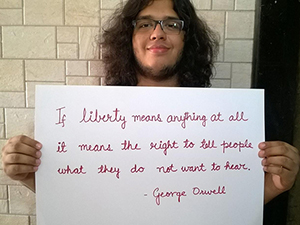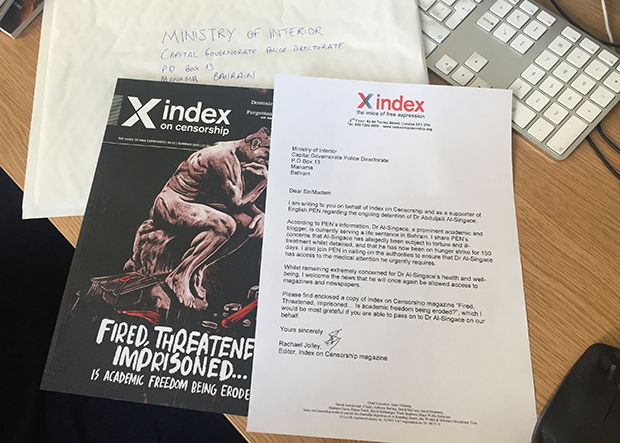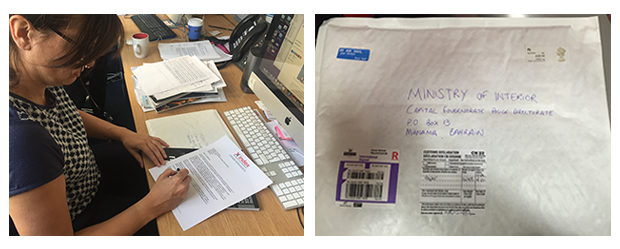18 Aug 2015 | Academic Freedom, Magazine, mobile, Student Reading Lists
Much of Index on Censorship’s global work involves allowing censored journalists an outlet to publish articles which may be unpublished in their home countries. This reading list, focusing on journalism, looks at issues surrounding freedom of expression and press freedom. It includes articles from Professor Emily Bell on the tools moving journalism forward and Professor Richard Sambrook’s reflection on the murders of journalists around the world that go unnoticed.
Students and academics can browse the Index magazine archive in thousands of university libraries via Sage Journals.
Journalism and censorship articles
Explosion of independent journalism by Stefan Bratkowski
Stefan Bratkowski, April 1987; vol. 16, 4: pp. 17-18
A message from Warsaw to the London censorship conference from a dissident
Back to the future by Iona Craig
Iona Craig, September 2014; vol. 43 , 3: pp. 8-12
Award-winning foreign correspondent Iona Craig discusses the growing need for journalist in war zones to go back to old ways of ignoring surveillance
The spirit of journalism by Ocak Isik Yurtcu
Ocak Isik Yurtcu, March 1997; vol. 26, 2: pp. 99-103
An imprisoned Turkish journalist, serving 15 years for anti-terror charges, discusses his experiences
Generation Why by Ian Hargreaves
In Index’s special report on the future of journalism, Ian Hargreaves considers whether the next generation of journalists will work with the public to hold the powerful to account
Users + Tools = Journalism by Emily Bell
Emily Bell, November 2007; vol. 36, 4: pp. 100-104
The Guardian’s Emily Bell on how technology is shaping the future of news and what editors need to do to adapt
Print Running by Will Gore
Will Gore, September 2014; vol. 43, 3: pp. 51-54
Another one from the special report on journalism, The Independent’s Will Gore looks at journalistic innovation
Re-writing the future: five young journalists from around the world by Ahlam Mohsen, Katharina Frick, Luca Rovinalti, Athandiwe Saba and Bhanuj Kappal
Ahlam Mohsen, Katharina Frick, Luca Rovinalti, Athandiwe Saba, Bhanuj Kappal, September 2014; vol. 43, 3: pp. 18-19
Five young journalists, from Yemen, South Africa, Germany, India and the Czech Republic, share their hopes for the profession
In quest of journalism by Jay Rosen
Jay Rosen, May 1997; vol. 26, 3: pp. 81-89
Michael Foley interviews New York University’s professor of journalism, Jay Rosen
Attack on ambition by Dina Meza
Dina Meza, September 2014; vol. 43, 3: pp. 30-33
Human rights campaigner and Index on Censorship Freedom of Expression Award’s nominee Dina Meza talks about the situation in Honduras where young journalists are entering a profession rife with corruption and fear
Journalists are dying every day by Richard Sambrook
Richard Sambrook, March 2015; vol. 44, 1: pp. 101-102
Professor Richard Sambrook delivers a morbid account of how the deaths of journalists around the world are going unnoticed
The reading list for journalism and censorship can be found here
18 Aug 2015 | Academic Freedom, mobile, News and features, United Kingdom, Youth Board
This is the fourth of a series of posts written by members of Index on Censorship’s youth advisory board.
Members of the board were asked to write a blog discussing one free speech issue in their country. The resulting posts exhibit a range of challenges to freedom of expression globally, from UK crackdowns on speakers in universities, to Indian criminal defamation law, to the South African Film Board’s newly published guidelines.
On 12 February 2015, the Counter-Terrorism and Security Act became law in the UK. If the fact that it is the seventh counter-terrorism bill in 14 years wasn’t enough to demonstrate the creep of governmental control, part five of the new legislation poses a direct and disturbing threat not just to freedom of expression but to knowledge and thought as well.
Part five of the Counter-Terrorism and Security Act places a statutory duty on public authorities to prevent terrorism. Under this remit falls schools and universities; places that used to be woven with the notion of free thought. The directions contained in the statute are unclear and gives universities the right to ban, exclude and prevent discussions that certain officials deem to incite radicalisation.
However, freedom of academic thought or discussion is not even the sole concern. London School of Economics Student Union’s community and welfare officer Aysha said: “Students who go to support services will now not be entitled to confidentiality under the new act if that person is deemed a ‘threat’, which is incredibly racialised.” In short, there is the potential that students would be unable to voice personal concerns, or the need for support, due to stereotypes that this act will enforce.
Jade Jackman, UK
Related:
• Harsh Ghildiyal: Defamation is not a crime
• Tom Carter: No-platforming Nigel
• Matthew Brown: Spying on NGOs a step too far
• About the Index on Censorship youth advisory board
• Facebook discussion: no-platforming of speakers at universities
18 Aug 2015 | India, mobile, News and features, Youth Board
This is the third of a series of posts written by members of Index on Censorship’s youth advisory board.
Members of the board were asked to write a blog discussing one free speech issue in their country. The resulting posts exhibit a range of challenges to freedom of expression globally, from UK crackdowns on speakers in universities, to Indian criminal defamation law, to the South African Film Board’s newly published guidelines.

Harsh Ghildiyal is a member of the Index youth advisory board. Learn more
Sections 499 and 500 of the Indian Penal Code, 1860, which criminalise defamation, have been challenged before the Supreme Court of India. In addition, sections of the Code of Criminal Procedure, 1973, which provide the procedure for prosecution, have been challenged.
Over the years, through several cases, the Supreme Court has made it clear that restrictions in place on speech must be reasonable, and only to the extent that they are necessary. Defamation is expressly listed as one of these reasonable restrictions but criminal defamation is not in the least bit reasonable. If the restriction goes beyond the intended purpose, it must be struck down.
Criminal defamation cases have been filed against the media, politicians and individuals for their statements. While adequate remedies for defamation exist under civil law, the provision criminalising defamation provides for imprisonment of up to two years, a fine or both. The punishment is disproportionate to an act which doesn’t go against society but against individuals.
More often than not used for dampening legitimate criticism rather than actually serving its purpose, criminal defamation is clearly not a reasonable restriction and can act as an impediment to free speech.
Harsh Ghildiyal, India
Related:
• Jade Jackman: An act against knowledge and thought
• Tom Carter: No-platforming Nigel
• Matthew Brown: Spying on NGOs a step too far
• About the Index on Censorship youth advisory board
• Facebook discussion: no-platforming of speakers at universities
17 Aug 2015 | Bahrain, Bahrain Letters, Campaigns

Today marks the 150th day of prominent Bahraini academic and blogger Dr. Abduljalil Al-Singace’s hunger strike.
Al-Singace is protesting prison conditions in Bahrain. He is currently being held in solitary confinement at Al Qalaa hospital due to his poor health, and is reportedly being denied access to the full medical assistance he requires. Al-Singace, who has been promoting human rights in Bahrain since 2000, is serving a life sentence for allegedly plotting to overthrow the government.
Index’s magazine editor, Rachael Jolley, responded to a call by English Pen to send a magazine for Abduljalil Al-Singace along with a copy of the letter below via the Ministry of Information.

You too can express your support for Al-Singace by signing the petition asking for the immediate and unconditional release of Al-Singace and of all those detained in Bahrain in violation of their right to freedom of expression.
You can also join the social media campaign for Al-Singace by sharing details of his case with your friends and contacts using #SingaceHungerStrike.
Letter to the Ministry of Interior
Ministry of Interior
Capital Governorate Police Directorate
P.O Box 13
Manama
Bahrain
Dear Sir/Madam
I am writing to you on behalf of Index on Censorship and as a supporter of English PEN regarding the ongoing detention of Dr Abduljalil Al-Singace.
According to PEN’s information, Dr Al-Singace, a prominent academic and blogger, is currently serving a life sentence in Bahrain. I share PEN’s concerns that Al-Singace has allegedly been subject to torture and ill-treatment whilst detained, and that he has now been on hunger strike for 150 days. I also join PEN in calling on the authorities to ensure that Dr Al-Singace has access to the medical attention he urgently requires.
Whilst remaining extremely concerned for Dr Al-Singace’s health and well-being, I welcome the news that he will once again be allowed access to magazines and newspapers.
Please find enclosed a copy of Index on Censorship magazine “Fired, threatened, imprisoned… Is academic freedom being eroded?”, which I would be most grateful if you are able to pass on to Dr. Al-Singace on our behalf.
Yours sincerely
Rachael Jolley,
Editor, Index on Censorship magazine



